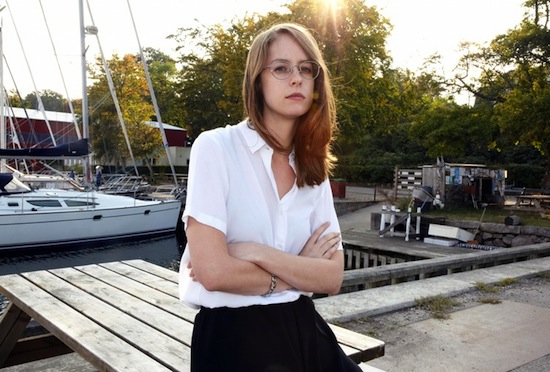Portrait by Emil Jupin
There’s a long silence on my Skype connection with Avalon Emerson, punctuated by the rapid yet gentle sounds of keyboard tapping and mouse clicking. She’s looking at the AbletonLive project for the track that propelled her to a much wider audience, ‘The Frontier’. “It’s two sawtooths, there’s one and then there’s a first one that’s synced at a quarter of the octave so that there’s a little bit of harmony and then the second one is detuned a little bit so it sounds ever so slightly dissonant,” she relays to me how the celestial, high-pitched synth line of the song was created. In the past couple of years, Emerson has released records via Icee Hot, Spring Theory and Shtum but it was this record, released via Tasker’s Whities label, which fuelled her blossoming popularity.
The past year has been a very notable shift in change for American born, Germany based DJ and producer, both musically and personally. In May, she quit her day job as a software engineer, a long time goal that she had kept relatively quiet about until it became a reality.
Since then, she’s been playing some of what she considers to be the best DJ sets of her life and released a beautifully crafted record that recalls the landscape of her childhood home of Arizona. When talking about the place where she took her first steps into the world, she animatedly recalls: “[There’s] the most beautiful, alien landscapes and massive skies and little, really gorgeous stampeding clouds.”
Since then, she’s been at work on a new record for Ghostly’s prolific dance music offshoot Spectral Sound. Narcissus In Retrograde is a very personal EP. It’s a record that clearly shows Emerson is a producer that embraces contrasts – taking textures with the coarseness of gravel and juxtaposing them with smooth, melodic synths. We talked over Skype as she sat in her newly moved in to flat in Berlin – musing on the new record, quitting her day job and the emphasis on beatmatching in DJing.
There’s one particular part of your music that I find really interesting and it’s the bass. The bass is so crystal clear and it rolls really elegantly in your productions.
Avalon Emerson: Thank you so much! I spend a lot of my time on the bass and the sub-bass.
I wanted to know more about what goes through your mind in terms of how you want to place the low end and convey this.
AE: A lot of those lower frequencies account for most of the volume and it can be really easy to get carried away with and end up being massively muddy especially when these songs are meant to be played in these enclosed, reverberating and often way overly pumped sub bass environments of the club, the engineering has to be there or it can sound really shitty.
If you’re making a track, do you tend to test it on a system before you would play it out or do you make it and then test it out when you next play?
AE: Yeah I test everything out when I play. The variation among club sound systems is too high for me to really worry too much about making it sound perfect before I bring it into this new environment because I don’t know how that room and system is going to sound so I play it on a bunch of different ones and try and glean a rational commonality.
Some of the producers that I am continually awestruck by their bass, thinking off the top of my head, Carl Craig or Shed for instance, I will sometimes try and A/B stuff next to that kind of thing but sometimes you play some old Carl Craig record out and it sounds really low and cloudy and kind of dark and that’s just the character of it. I’m getting more comfortable with having something not be really “perfect” after it leaves my studio because like I said, clubs sound different and it just ends up sounding more like me instead of trying to achieve some sort of ideal that might not even be what I want anyway.
You said a couple of the tracks on this record were quite strong emotional follow-ups from ‘The Frontier’, where was your head at writing and recording this EP?
AE: They’re not necessarily direct emotional follow-ups in that they’re coming from the same emotional place. I think they are more tonal follow-ups to it; they neatly follow where I’m going with my music from ‘The Frontier’ – particularly into ‘Natural Impasse’.
I feel I’m getting better at streamlining my process, starting with something abstract, broad, and non-musical, for instance either some painful or happy personal experience and during the process of translating it into a song, trimming down ideas instead of adding them. I’ve been using almost exclusively digital music production software for so long, and all the limitlessness of that has made me create in more of a maximalist way. The last couple of years I’ve been trying to incorporate more minimalist creation processes. Not that it’s working but I’m trying.
What has been happening for you in the past year that became the inspiration for this?
AE: I think there have been a couple of big, tumultuous relationship events in my family and friends around me. It’s a really personal record, the name refers to what I’ve been going through – turning things around instead of just accepting them at the face value.
Also thinking about what I really want out of life and what I want to do, being open and honest with myself. Also taking chances instead of necessarily always doing the safe proper thing. I quit my software engineering job this year, I quit my job in May and it was the first time I haven’t had a steady job since I was 15. Leaving this solid, decently paying job… It was pretty scary and exciting at the same time. I would definitely make music even if no one heard it but since I also really like DJing and it was one of my goals for moving here, if I could make it work, then there would be other career reasons of moving to Berlin other than just living outside of America.
This past year or so is when it seemed like a realistic option to make music my full time job. I was basically playing every week, sometimes even two or three times a weekend and then coming back into work on a Monday morning and being at the stand up with my software team [Laughs] and not trying to stress out the intern too bad. Basically, after that, it’s been a big personal and emotional shift of making this thing that has always been a hobby and a release… my day job.
I can imagine that it feels really great though. There was never a heavy indication that you were planning to leave the day job.
AE: Yeah. I didn’t really think it would be an option and I also like coding. To be honest I love it! I like getting in the zone and six hours going by and then thinking, “Okay, time to get some food now.” I definitely feel that same sort of high when I’m producing so just transferring this output energy from a hobby release to being my day job and now I gotta finish this EP kind of thing. As far as coding projects, I still have some little things going on but it’s mainly for fun now.
When it came to recording Narcissus In Retrograde, what were you hoping to relay sonically with the record?
AE: Pretty much all that was recorded within a week except for Natural Impasse, which I wrote last November. I had a lot of other tracks that could have been on the EP but I really like the way that the A side is this bright, emotive and chugging, gravelly rhythms with this light, playful, dancing synths and everything and then the B side in contrast is darker and an exercise in me trying to be a bit harder and more minimalist. I’m really proud of all of the tracks and how they play in with each other.
In a previous interview, you were talking about how beatmatching isn’t the goal for DJ and instead it’s piecing these selections together and putting tracks together that compliment each other in terms of emotion. Do you feel that there can be too much of an emphasis on perfect mixing when it comes to DJing?
AE: Massive respect to all of the heavily touring DJs who still travel with heavy bags of vinyl and stuff but in my opinion that’s not what makes a good or bad DJ – how well you can or cannot beat match or what medium you play. When I play, I think of things in terms of words I’ll string together to make a sentence which can develop into an idea or a feeling. Whether it’s a similar, rolling, percussive, fast, techno agitation things or earthy, deeper, more emotional house-y stuff. I basically just have all of my different; oddly named playlist names [Laughs] I have acid techno crucible, earthy power, weird drum.





